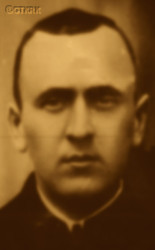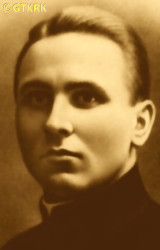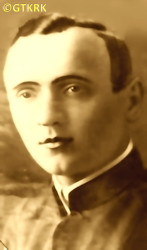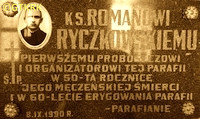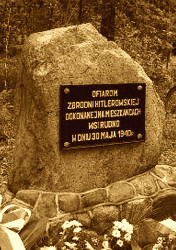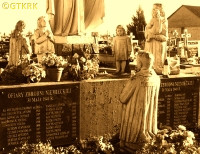Roman Catholic
St Sigismund parish
05-507 Słomczyn
85 Wiślana Str.
Konstancin deanery
Warsaw archdiocese, Poland
full list:
displayClick to display full list

searchClick to search full list by categories
wyświetlKliknij by wyświetlić pełną listę po polsku

szukajKliknij by przeszukać listę wg kategorii po polsku

Martyrology of the clergy — Poland
XX century (1914 – 1989)
personal data
religious status
Servant of God
surname
RYCZKOWSKI
forename(s)
Roman
function
diocesan priest
creed
Latin (Roman Catholic) Church RCmore on
en.wikipedia.org
[access: 2014.09.21]
diocese / province
Siedlce diocesemore on
en.wikipedia.org
[access: 2022.01.06]
honorary titles
„Polonia Restituta” Cross — 4th Class, Officer'smore on
„Polonia Restituta” Cross – 4th_Class, Officer's
(29.03.2017)
date and place
of death
30.05.1940

Plantatoday: Wohyń gm., Radzyń Podlaski pov., Lublin voiv., Poland
more on
en.wikipedia.org
[access: 2021.05.30]
alt. dates and places
of death
Rudnotoday: Milanów gm., Parczew pov., Lublin voiv., Poland
more on
en.wikipedia.org
[access: 2021.05.30]
details of death
During Polish–Russian war of 1919‐1921, drafted — as a gymnasium student — into Polish Army. Served for 10 months. Later, before starting his theology studies, drafted into the Polish Army again.
After German and Russian invasion of Poland in 09.1939 and start of the World War II, after start of German occupation, arrested by the Germans on 30.05.1940 — during a retaliation action for the death of a German soldier.
Germans took c. 100 hostages and sentenced them to death.
During the execution offered his life for the others — the offer was accepted but despite of this half of the arrested were executed.
According to other accounts was in a group of those released by the Germans — about half of the arrested — but decided to accompany the group to be murdered, hearing confessions and praying till the end for the dying.
Perished as the last one — his body was discovered after the war at the top of the pile of victims.
cause of death
mass murder
perpetrators
Germans
sites and events
PlantaClick to display the description, GeneralgouvernementClick to display the description, Collective responsibility („Hostages”)Click to display the description, Ribbentrop‐MolotovClick to display the description, Pius XI's encyclicalsClick to display the description, Polish‐Russian war of 1919‐1921Click to display the description
date and place
of birth
09.10.1901Birth certification on:
skanoteka.genealodzy.pl
[access: 2025.04.13]

Węgrówtoday: Węgrów urban gm., Węgrów pov., Masovia voiv., Poland
more on
en.wikipedia.org
[access: 2021.08.20]
parents
RYCZKOWSKI John
🞲 1861, Węgrówtoday: Węgrów urban gm., Węgrów pov., Masovia voiv., Poland
more on
en.wikipedia.org
[access: 2021.08.20] — 🕆 ?, ?

KOSTRZEWA Thecla
🞲 1867, Węgrówtoday: Węgrów urban gm., Węgrów pov., Masovia voiv., Poland
more on
en.wikipedia.org
[access: 2021.08.20] — 🕆 ?, ?
baptism
13.10.1901Birth certification on:
skanoteka.genealodzy.pl
[access: 2025.04.13]

Węgrówtoday: Węgrów urban gm., Węgrów pov., Masovia voiv., Poland
more on
en.wikipedia.org
[access: 2021.08.20]
Assumption of the Blessed Virgin Mary and St Peter, St Paul and St Andrew the Apostles RC church
presbyter (holy orders)
ordination
03.09.1928

positions held
1934 – 1940
parish priest — Rudnotoday: Milanów gm., Parczew pov., Lublin voiv., Poland
more on
en.wikipedia.org
[access: 2021.05.30] ⋄ Transfiguration of the Lord RC church ⋄ Transfiguration of the Lord and St Andrzej Bobola RC parish ⋄ Radzyń Podlaskitoday: Radzyń Podlaski gm., Radzyń Podlaski pov., Lublin voiv., Poland
more on
en.wikipedia.org
[access: 2021.12.18] RC deanery
1932 – 1934
administrator — Sosnowicatoday: Sosnowica gm., Parczew pov., Lublin voiv., Poland
more on
en.wikipedia.org
[access: 2022.06.13] ⋄ Holy Trinity RC parish ⋄ Parczewtoday: Parczew gm., Parczew pov., Lublin voiv., Poland
more on
en.wikipedia.org
[access: 2021.12.18] RC deanery
1930 – 1932
administrator — Wola Osowińskatoday: Borki gm., Radzyń Podlaski pov., Lublin voiv., Poland
more on
en.wikipedia.org
[access: 2022.01.09] ⋄ Assumption of the Blessed Virgin Mary RC church ⋄ Nativity of the Blessed Virgin Mary RC parish ⋄ Radzyń Podlaskitoday: Radzyń Podlaski gm., Radzyń Podlaski pov., Lublin voiv., Poland
more on
en.wikipedia.org
[access: 2021.12.18] RC deanery
1930
vicar — Kocktoday: Kock gm., Lubartów pov., Lublin voiv., Poland
more on
en.wikipedia.org
[access: 2021.09.02] ⋄ Assumption of the Blessed Virgin Mary RC parish ⋄ Radzyń Podlaskitoday: Radzyń Podlaski gm., Radzyń Podlaski pov., Lublin voiv., Poland
more on
en.wikipedia.org
[access: 2021.12.18] RC deanery
1929 – 1930
vicar — Międzyrzec Podlaskitoday: Międzyrzec Podlaski gm., Biała Podlaska pov., Lublin voiv., Poland
more on
en.wikipedia.org
[access: 2020.12.11] ⋄ St Joseph Spouse of the Blessed Virgin Mary RC parish ⋄ Międzyrzec Podlaskitoday: Międzyrzec Podlaski gm., Biała Podlaska pov., Lublin voiv., Poland
more on
en.wikipedia.org
[access: 2020.12.11] RC deanery
1928 – 1929
vicar — Garwolintoday: Garwolin gm., Garwolin pov., Masovia voiv., Poland
more on
en.wikipedia.org
[access: 2021.09.29] ⋄ Transfiguration of the Lord RC parish ⋄ Garwolintoday: Garwolin gm., Garwolin pov., Masovia voiv., Poland
more on
en.wikipedia.org
[access: 2021.09.29] RC deanery
1923 – 1928
student — Janów Podlaskitoday: Janów Podlaski gm., Biała Podlaska pov., Lublin voiv., Poland
more on
en.wikipedia.org
[access: 2021.12.18] ⋄ philosophy and theology, Theological Seminary
sites and events
descriptions
Planta: In the forest near Planta village near Radzyń Podlaski on 30.05.1940 the Germans in retaliation for an unexplained death of a German soldier brought c. 100 Poles from Rudno village (c. 5 km from Planty) — who got accused of this death. Half of them — mainly older ones and children — were released. The rest, in two turns, were taken to a gravel or clay pit and murdered — forced to lie down in the pit and gunned them down with a machine gun, killing off with shots from a pistol. (more on: www.gok.superhost.plClick to attempt to display webpage
[access: 2013.08.10])
Generalgouvernement: After the Polish defeat in the 09.1939 campaign, which was the result of the Ribbentrop‐Molotov Pact and constituted the first stage of World War II, and the beginning of German occupation in part of Poland (in the other, eastern part of Poland, the Russian occupation began), the Germans divided the occupied Polish territory into five main regions. In two of them new German provinces were created, two other were incorporated into other provinces. However, the fifth part was treated separately, and in a political sense it was supposed to recreate the German idea from 1915 (during World War I, after the defeat of the Russians in the Battle of Gorlice in 05.1915) of creating a Polish enclave within Germany. Illegal in the sense of international law, i.e. Hague Convention, and public law, managed by the Germans according to separate laws — especially established for the Polish Germ. Untermenschen (Eng. subhumans) — till the Russian offensive in 1945 it constituted part of the Germ. Großdeutschland (Eng. Greater Germany). Till 31.07.1940 formally called Germ. Generalgouvernement für die besetzten polnischen Gebiete (Eng. General Government for the occupied Polish lands) — later simply Germ. Generalgouvernement (Eng. General Governorate), as in the years 1915‐1918. From 07.1941, i.e. after the German attack on 22.06.1941 against the erstwhile ally, the Russians, it also included the Galicia district, i.e. the Polish pre‐war south‐eastern voivodeships. A special criminal law was enacted and applied to Poles and Jews, allowing for the arbitrary administration of the death penalty regardless of the age of the „perpetrator”, and sanctioning the use of collective responsibility. After the end of the military conflict of the World War UU, the government of the Germ. Generalgouvernement was recognized as a criminal organization, and its leader, governor Hans Frank, guilty of war crimes and crimes against humanity and executed. (more on: en.wikipedia.orgClick to attempt to display webpage
[access: 2024.12.13])
Collective responsibility („Hostages”): A criminal practice implemented by the Germans in the occupied territories of Poland, applied from the very first day of World War II. At its core was an appointment and public announcement of a list of names of selected people whose lives depended on absolute compliance with German orders. Any violation of these ordinances, by any person, regardless of the circumstances, resulted in the murder of the designated „hostages”. In the first days of the war and occupation, it was used i.a. by the German Wehrmacht army to prevent acts of continuation of the defense by the Poles. Later, especially in the German‐run General Governorate, it was part of the official policy of the occupation authorities — collective responsibility for any acts of resistance to the occupier's practices. For the life of one German, even if death was due to customary reasons, the Germans carried out executions from a dozen to even a hundred Poles previously designated as „hostages”.
Ribbentrop‐Molotov: Genocidal Russian‐German alliance pact between Russian leader Joseph Stalin and German leader Adolf Hitler signed on 23.08.1939 in Moscow by respective foreign ministers, Mr. Vyacheslav Molotov for Russia and Joachim von Ribbentrop for Germany. The pact sanctioned and was the direct cause of joint Russian and German invasion of Poland and the outbreak of the World War II in 09.1939. In a political sense, the pact was an attempt to restore the status quo ante before 1914, with one exception, namely the „commercial” exchange of the so‐called „Kingdom of Poland”, which in 1914 was part of the Russian Empire, fore Eastern Galicia (today's western Ukraine), in 1914 belonging to the Austro‐Hungarian Empire. Galicia, including Lviv, was to be taken over by the Russians, the „Kingdom of Poland” — under the name of the General Governorate — Germany. The resultant „war was one of the greatest calamities and dramas of humanity in history, for two atheistic and anti‐Christian ideologies — national and international socialism — rejected God and His fifth Decalogue commandment: Thou shall not kill!” (Abp Stanislav Gądecki, 01.09.2019). The decisions taken — backed up by the betrayal of the formal allies of Poland, France and Germany, which on 12.09.1939, at a joint conference in Abbeville, decided not to provide aid to attacked Poland and not to take military action against Germany (a clear breach of treaty obligations with Poland) — were on 28.09.1939 slightly altered and made more precise when a treaty on „German‐Russian boundaries and friendship” was agreed by the same murderous signatories. One of its findings was establishment of spheres of influence in Central and Eastern Europe and in consequence IV partition of Poland. In one of its secret annexes agreed, that: „the Signatories will not tolerate on its respective territories any Polish propaganda that affects the territory of the other Side. On their respective territories they will suppress all such propaganda and inform each other of the measures taken to accomplish it”. The agreements resulted in a series of meeting between two genocidal organization representing both sides — German Gestapo and Russian NKVD when coordination of efforts to exterminate Polish intelligentsia and Polish leading classes (in Germany called «Intelligenzaktion», in Russia took the form of Katyń massacres) where discussed. Resulted in deaths of hundreds of thousands of Polish intelligentsia, including thousands of priests presented here, and tens of millions of ordinary people,. The results of this Russian‐German pact lasted till 1989 and are still in evidence even today. (more on: en.wikipedia.orgClick to attempt to display webpage
[access: 2015.09.30])
Pius XI's encyclicals: Facing the creation of two totalitarian systems in Europe, which seemed to compete with each other, though there were more similarities than contradictions between them, Pope Pius XI issued in 03.1937 (within 5 days) two encyclicals. In the „Mit brennender Sorge” (Eng. „With Burning Concern”) published on 14.03.1938, condemned the national socialism prevailing in Germany. The Pope wrote: „Whoever, following the old Germanic‐pre‐Christian beliefs, puts various impersonal fate in the place of a personal God, denies the wisdom of God and Providence […], whoever exalts earthly values: race or nation, or state, or state system, representatives of state power or other fundamental values of human society, […] and makes them the highest standard of all values, including religious ones, and idolizes them, this one […] is far from true faith in God and from a worldview corresponding to such faith”. On 19.03.1937, published „Divini Redemptoris” (Eng. „Divine Redeemer”), in which criticized Russian communism, dialectical materialism and the class struggle theory. The Pope wrote: „Communism deprives man of freedom, and therefore the spiritual basis of all life norms. It deprives the human person of all his dignity and any moral support with which he could resist the onslaught of blind passions […] This is the new gospel that Bolshevik and godless communism preaches as a message of salvation and redemption of humanity”… Pius XI demanded that the established human law be subjected to the natural law of God , recommended the implementation of the ideal of a Christian state and society, and called on Catholics to resist. Two years later, National Socialist Germany and Communist Russia came together and started World War II. (more on: www.vatican.vaClick to attempt to display webpage
[access: 2023.05.28], www.vatican.vaClick to attempt to display webpage
[access: 2023.05.28])
Polish‐Russian war of 1919‐1921: War for independence of Poland and its borders. Poland regained independence in 1918 but had to fight for its borders with former imperial powers, in particular Russia. Russia planned to incite Bolshevik‐like revolutions in the Western Europe and thus invaded Poland. Russian invaders were defeated in 08.1920 in a battle called Warsaw battle („Vistula river miracle”, one of the 10 most important battles in history, according to some historians). Thanks to this victory Poland recaptured part of the lands lost during partitions of Poland in XVIII century, and Europe was saved from the genocidal Communism. (more on: en.wikipedia.orgClick to attempt to display webpage
[access: 2014.12.20])
sources
personal:
pl.wikipedia.orgClick to attempt to display webpage
[access: 2012.11.23], www.gok.superhost.plClick to attempt to display webpage
[access: 2013.08.10], www.niedziela.plClick to attempt to display webpage
[access: 2015.05.09], skanoteka.genealodzy.plClick to attempt to display webpage
[access: 2025.04.13], radzyninfo.plClick to attempt to display webpage
[access: 2019.10.13], sip.lex.plClick to attempt to display webpage
[access: 2025.08.19]
original images:
www.gok.superhost.plClick to attempt to display webpage
[access: 2013.08.10], radzyninfo.plClick to attempt to display webpage
[access: 2019.10.13], kochamradzyn.plClick to attempt to display webpage
[access: 2025.02.11], 24wspolnota.plClick to attempt to display webpage
[access: 2019.10.13]
LETTER to CUSTODIAN/ADMINISTRATOR
If you have an Email client on your communicator/computer — such as Mozilla Thunderbird, Windows Mail or Microsoft Outlook, described at WikipediaPatrz:
en.wikipedia.org, among others — try the link below, please:
LETTER to CUSTODIAN/ADMINISTRATORClick and try to call your own Email client
If however you do not run such a client or the above link is not active please send an email to the Custodian/Administrator using your account — in your customary email/correspondence engine — at the following address:

giving the following as the subject:
MARTYROLOGY: RYCZKOWSKI Roman
To return to the biography press below:
 Click to return to biography
Click to return to biography








